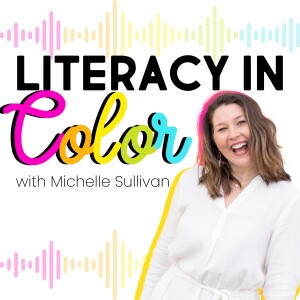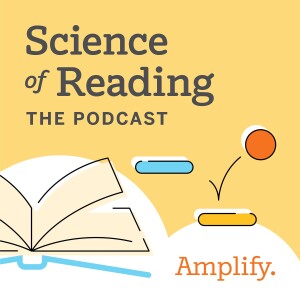

Literacy in Color: A Science of Reading Aligned Podcast for Educators
https://feeds.captivate.fm/literacy-in-color/Episode List

53. The High Frequency Word Project with Rebecca Loveless & Fiona Hamilton
What if high-frequency words aren’t “irregular” after all?In this episode of Literacy in Color, I sit down with Rebecca Loveless and Fiona Hamilton, co-authors of The High Frequency Word Project, to dig into the stories behind some of the most common words in English.Too often, these little “function words” get handed to students on flashcards with the message: just memorize it. But Rebecca and Fiona show us that high-frequency words aren’t exceptions to the system, they have explanations. When we teach students the phonology, morphology, etymology, and meaning layers of these words, we give them logic, structure, and stories they can hold onto for life.Key Takeaways:Why high-frequency words can be particularly tricky for students (and why function words often have “nebulous” meanings)The role of storytelling in making these words memorable, meaningful, and engagingHow many high-frequency words trace back to Old English and what that history reveals about spelling todayThe difference between memorization and true orthographic mappingPractical classroom routines, like anchor–analyze–practice, tap spelling, and meaning games, that help students succeedWhether you’ve ever wondered why “was” has an a, or why “know” keeps its silent k, this conversation will leave you empowered with strategies and stories to bring into your classroom.Resources:Grab your copy of The High Frequency Word ProjectHigh Frequency Word Project WebsiteHigh Frequency Word Project Facebook PageThis post may contain affiliate links, which means if you click on a link and make a purchase, I may earn a small commission at no additional cost to you. Thank you for supporting the podcast!Connect with Rebecca Loveless:Website: www.illuminatewords.comLinkedInEmail: rebecca@rebeccaloveless.comConnect with Fiona Hamilton:Website: https://wordtorque.comLinkedInEmail: fiona@wordtorque.comConnect with Me:Follow me on Instagram: @michelle_thecolorfulclassroom & @logosliteracyacademyJoin our Facebook CommunitySign up for my NewsletterShop on TPT: The Colorful ClassroomVisit: www.michelleandthecolorfulclassroom.comJoin The COLORFUL Literacy Toolkit MembershipInterested in Learning More about Morphology?Take our Course: Mastering Morphology: Foundations for Every Educator

52. Phonemic Awareness Research Unpacked with Dr. David Kilpatrick
In this pivotal episode of Literacy in Color, Michelle is joined by psychologist, professor, and reading researcher Dr. David Kilpatrick to untangle some hotly debated ideas surrounding phonemic awareness in the Science of Reading community.This conversation isn’t about taking sides in the “with letters vs. without letters” debate. It’s about getting honest about what the research says, and more importantly, what our individual students truly need.For most children, phonemic awareness develops naturally through phonics instruction. However, for others, particularly those with a phonological core deficit, explicit, oral-only phonemic awareness instruction can be critical.Dr. Kilpatrick clarifies the National Reading Panel findings, unpacks common misinterpretations of his own work, and reminds us to focus on what matters most: meeting the needs of the learner in front of us.Key Takeaways:How phonemic proficiency fuels orthographic mapping, which is essential for fluent word reading For typically developing readers, phonemic awareness develops through learning an alphabetic writing system (i.e. Phonemic Awareness with letters!)It’s beneficial to integrate phonemic awareness and phonicsStudents with phonological core deficits may need oral-only instruction, particularly in intervention settingsPhonemic awareness tasks should only take a few minutes a day - they’re not meant to be long, isolated blocksWhat educators often get wrong about Kilpatrick’s work and what he wishes more people knewResources & References Mentioned:Look into Appendix F of the National Reading PanelTable of Types of PA TasksPhoneme Manipulation Quotes Across the DecadesWIAT-4 Phonemic Proficiency Results (Single Slide)Teaching Phonemic Awareness in 2024: A Guide for EducatorsEquipped for Reading Success by Dr. David KilpatrickEssentials of Assessing, Preventing, and Overcoming Reading Difficulties by Dr. David KilpatrickThe PAST TenseShanahan’s Blog: RIP to Advanced Phonemic Awareness (meaning the term should be abandoned)This post may contain affiliate links, which means if you click on a link and make a purchase, I may earn a small commission at no additional cost to you. Thank you for supporting the podcast!Connect with Me:Follow me on Instagram: @michelle_thecolorfulclassroom & @logosliteracyacademyJoin our Facebook CommunitySign up for my NewsletterShop on TPT: The Colorful ClassroomVisit: www.michelleandthecolorfulclassroom.comJoin The COLORFUL Literacy Toolkit MembershipInterested in Learning More about Morphology?Take our Course: Mastering Morphology: Foundations for Every Educator

51. Rethinking Sight Words with Pryor Rayburn, Orton Gillingham Mama
In this episode of Literacy in Color, Michelle sits down with THE Orton Gillingham Mama, Pryor Rayburn to take a deep dive into the hot-button world of sight words and high-frequency word instruction.Pryor busts through common myths, clears up confusing terminology, and explores brain-based practices for teaching high frequency words through the lens of orthographic mapping. Whether you’ve relied on word lists, flashcards, or shape-based strategies in the past, this conversation will help you rethink your approach with evidence and intention.Key Takeaways:What sight words, high-frequency words, heart words, and red words really meanWhy memorization isn’t the goal—and how orthographic mapping is the keyHow to move beyond visual memory and shape-based cuesThe missing pieces in popular “heart word” methods—and how to fix themHow to anchor meaning, teach irregular spellings, and bring context to every wordClassroom-ready routines and tweaks for kinder through upper elementaryResources Mentioned:Pryor’s Free Sight Words QuizPryor’s Sight Words Course: How to Quickly Teach (and Master) Sight WordsConnect with Pryor Rayburn:Website: www.OrtonGillinghamMama.comInstagram: @OrtonGillinghamMamaEmail: Pryor@OrtonGillinghamMamaConnect with Me:Follow me on Instagram: @michelle_thecolorfulclassroom & @logosliteracyacademyJoin our Facebook CommunitySign up for my NewsletterShop on TPT: The Colorful ClassroomVisit: www.michelleandthecolorfulclassroom.comJoin The COLORFUL Literacy Toolkit MembershipInterested in Learning More about Morphology?Take our Course: Mastering Morphology: Foundations for Every Educator

50. The Truth About Progress Monitoring: Myth Busting with Shannon Moore, Moore Literacy Leaps
In this episode, Michelle is joined by instructional coach and literacy specialist Shannon Moore of Moore Literacy Leaps to bust four major myths about progress monitoring in reading instruction.Together, they tackle what progress monitoring really is (and what it’s not), how it fits into the MTSS framework, and why all students, not just those below grade level, deserve targeted goals and regular check-ins.Whether you're a classroom teacher, reading interventionist, or coach trying to find your rhythm with data collection and student support, this episode will leave you feeling empowered and equipped.Key Takeaways:The real definition of progress monitoring (hint: it’s simpler than you think!)How to avoid common mistakes and save time with smarter systemsWhy goal-setting and student ownership can change everythingWhat to track, how often to assess, and where to beginTools you can use right away to stay organized and proactiveResources Mentioned:Shannon’s Reading Intervention ToolkitShannon’s Progress Monitoring Tracking SheetShannon’s FREE Editable Reading Intervention Schedule TemplateConnect with Shannon Moore:Instagram: @mooreliteracyleapsWebsite: https://www.mooreliteracyleaps.com/TPT Store: Moore Literacy LeapsConnect with Me:Follow me on Instagram: @michelle_thecolorfulclassroom & @logosliteracyacademyJoin our Facebook CommunitySign up for my NewsletterShop on TPT: The Colorful ClassroomVisit: www.michelleandthecolorfulclassroom.comJoin The COLORFUL Literacy Toolkit MembershipInterested in Learning More about Morphology?Take our Course: Mastering Morphology: Foundations for Every Educator

49. Set for Variability with Jen Yagid and Wendy Darasz, Informed Literacy
What does it really mean to be “set for variability”? In this episode, Michelle is joined by Jen Yagid and Wendy Darasz of Informed Literacy to break down this complex-sounding but classroom-friendly concept. Together, they demystify set for variability, explore its role in decoding, and share practical classroom examples.If you’ve ever wondered how to support students in correcting their own mispronunciations or how to help them flex vowel sounds when the code doesn’t quite match the pronunciation, this episode is packed with practical tips and strategies.Key Takeaways:What “set for variability” actually means (in teacher terms)Why strong decoding is the first step—and flexibility is the secondWhen and how to support struggling readers using this approachHow SSV differs from guessing or 3-cueingHow to build flexibility through small-group cues, hand motions, and sentence contextWhy “the world is not decodable”—and what that means for our instructionResources Mentioned:Informed Literacy Blog Post: What is Set for Variability and Why is it Important?Informed Literacy Decodables: Jen & Wendy are offering a coupon code: COLOR2025 for one month (until September 2025) just for you! When you purchase a set of their hardcopy decodables, you will get our Supplemental Resource pack for free (You need to put the decodables and the supplemental resource pack into the cart and enter the coupon code: COLOR2025)Informed Literacy Decodable Book FreebieHelpful References:Set for Variability as a Critical Predictor of Word Reading: Potential Implications for Early Identification and Treatment of DyslexiaUnpacking the Unique Relationship Between Set for Variability and Word Reading Development: Examining Word- and Child-Level Predictors of PerformanceSpelling as Statistical Learning: Using Consonantal Context to Spell VowelsThe Importance of Flexibility of Pronunciation in Learning to Decode: A Training Study in Set for VariabilityThe Role of Set for Variability in Irregular Word Reading: Word and Child Predictors in Typically Developing Readers and Students At-Risk for Reading DisabilitiesConnect with Jen & Wendy from Informed Literacy:Website: InformedLiteracy.com Instagram: @informedlitInformed Literacy on YouTubeFacebook: @informedlitPinterest: @informedlitInformed Literacy Decodables: Use coupon code: COLOR2025 for one month (until September 2025) for a free Supplemental Resource pack when purchasing their hardcopy decodables. (You need to put the decodables and the supplemental resource pack into the cart and enter the coupon code: COLOR2025)Informed Literacy Decodable Book FreebieEmail: support@informedliteracy.comConnect with Me:Follow me on Instagram: @michelle_thecolorfulclassroom & @logosliteracyacademyJoin our Facebook CommunitySign up for my NewsletterShop on TPT: The Colorful ClassroomVisit: www.michelleandthecolorfulclassroom.comJoin The COLORFUL Literacy Toolkit MembershipInterested in Learning More about Morphology?Take our Course: Mastering Morphology: Foundations for Every Educator
You may also like
Create Your Podcast In Minutes
- Full-featured podcast site
- Unlimited storage and bandwidth
- Comprehensive podcast stats
- Distribute to Apple Podcasts, Spotify, and more
- Make money with your podcast












